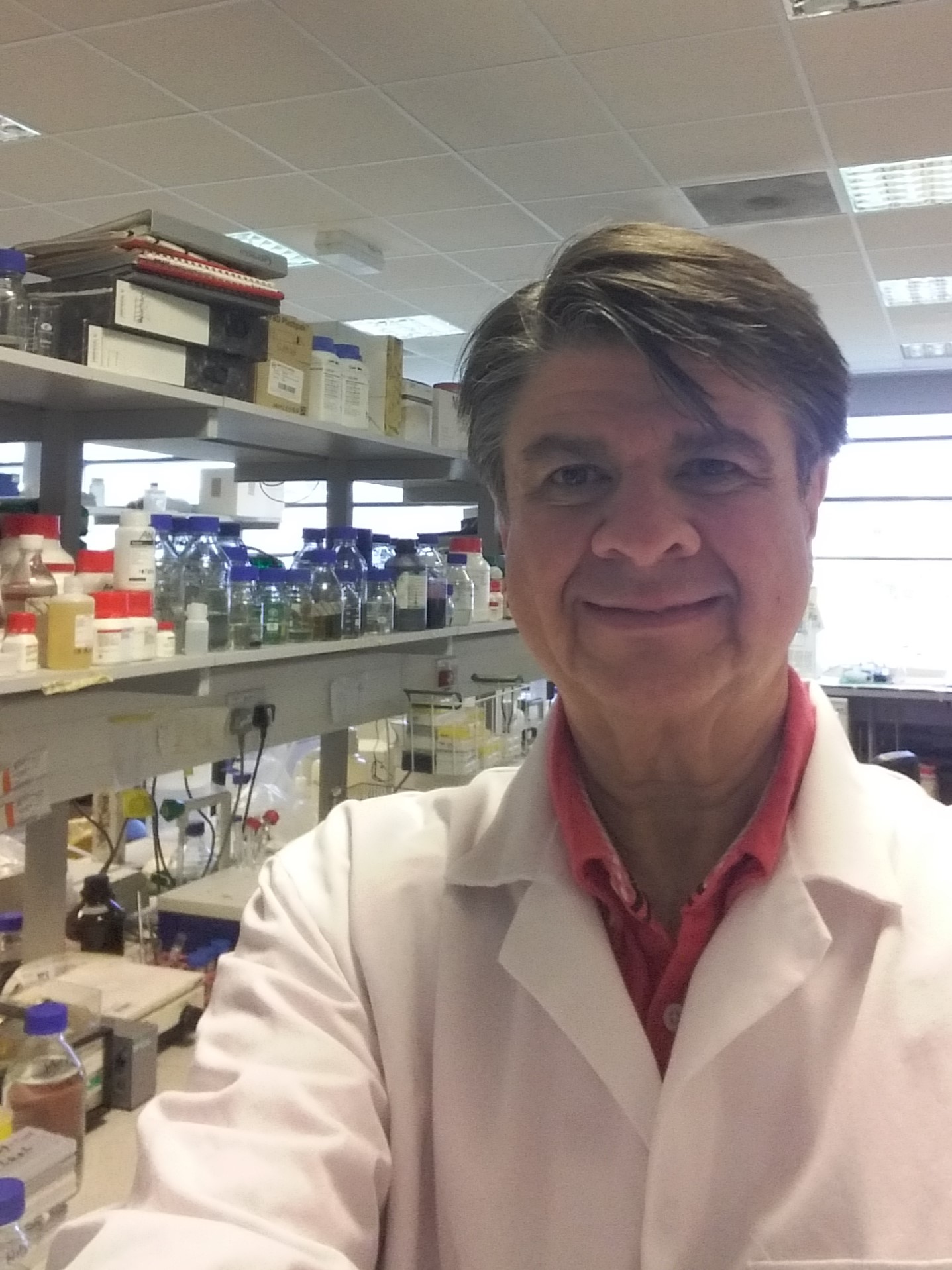
Dr Nigel Jones BSc, PhD
Programme Director - BSc Pharmacology School of Life Sciences
- Work email N.J.Jones@liverpool.ac.uk
- Personal WebsiteFanconi anaemia
- About
- Research
- Publications
- Teaching
- Professional Activities
Research
Research Interests
My research interests lay primarily in the study of the DNA damage response (DDR) and the role that DNA repair mechanisms, in particular, protect against cancer. Specific areas of activity are the human genetic disorder Fanconi anaemia (eg: DOI: 10.1016/j.molcel.2010.03.003) and the role of the dinucleotide Ap4A in the DDR (eg: DOI: 10.1016/j.dnarep.2015.06.008).
Fanconi anaemia (FA) is characterised by bone marrow failure, genetic instability and cancer predisposition, particularly acute myeloid leukaemia (AML) and head and neck squamous cell carcinoma (HNSCC). At least twenty FA genes have now been identified and the encoded proteins operate in the DDR to interstrand cross-links (ICL). This form of damage, induced by agents such as mitomycin C and cis-platin, links the two strands of DNA and stalls the progression of DNA replication. It is now believed that the FA pathway protects cells from DNA damage arising from endogenous aldehydes such as acetaldehyde and formaldehyde. Several of the FA genes are also breast cancer susceptibility genes, most notably FANCD1/BRCA2. My research on FA has focused on the role of the proteins FANCG and FANCD2, in particular how phosphorylation modulates their activity and their protein binding partners (DOI: 10.1038/sj.onc.1211034), how they function in homologous recombination repair, potential roles they may have outside of the canonical FA pathway and how they predispose to a variety of cancers including breast and cervical cancer (DOI: 10.2353/ajpath.2010.090779).
The dinucleotide diadenosine tetraphosphate (Ap4A) is synthesised in response to a variety of stresses and has previously been implicated in DNA damage responses. We have established that Ap4A plays an important role in cellular responses to DNA damaging agents, in particular ICL agents such as mitomycin C, but also aldehydes including acetaldehyde. Research on Ap4A is focused on elucidating the role Ap4A plays in mediating cellular responses to ICL and in how Ap4A may down-regulate cancer promoting genes (DOI: 10.1371/journal.pone.0154674).
Research Grants
Genetic analysis of the cancer prone syndrome Fanconi anaemia: Mitomycin C - hypersensitive Chinese hamster cell mutants as a model system.
NORTH WEST CANCER RESEARCH FUND
September 2000 - September 2003
Molecular and cellular characterisation of nitrogen mustard-hypersensitive Chinese hamster cell mutants: possible models for the human syndrome Fanconi anaemia.
THE NUFFIELD FOUNDATION (UK)
June 2002 - October 2002
Homologous recombination and BRCA1/RAD51 foci formation in mammalian cell mutants defective in the Fanconi anaemia and ataxia telangiectasia DNA damage response pathways.
NORTH WEST CANCER RESEARCH FUND
September 2003 - September 2006
Regulation of DNA replication by diadenosine nucleotides after DNA damage
NORTH WEST CANCER RESEARCH FUND
October 2013 - September 2016
Interactions of the FANCD2 protein in the Fanconi-BRCA tumour suppressor pathway
YALE SCHOOL OF MEDICINE (USA)
December 2009 - November 2010
The role of the Fanconi anaemia protein FANCG in mediating the formation of a protein complex containing homologous recombination proteins BRCA2 and XRCC3 and its role in replication fork progression.
NORTH WEST CANCER RESEARCH FUND
September 2006 - September 2009
The role of diadenosine tetraphosphate (Ap4A) in the DNA damage response
NORTH WEST CANCER RESEARCH FUND
October 2010 - September 2013
Miss Batool Almarzouq - Bench fees
ROYAL EMBASSY OF SAUDI ARABIA
November 2014 - October 2017
Research Collaborations
Dr. Gary M. Kupfer
External: Yale University School of Medicine
Investigating the role of phosphorylation in the activity of Fanconi anaemia proteins
Prof Sandy McLennan
Internal
Role of Ap4A in the DNA damage response
Dr Roger Barraclough
Internal
FANCD2 and triple-negative breast cancer
Dr Janet Risk
Internal
The Fanconi anaemia pathway in HNSCC and cervical cancer
Dr Nikki Copeland
External: University of Lancaster
Role of Ap4A in the DNA damage response/DNA replication
Dr Stefan Meyer
External: University of Manchester
Translational and clinical studies of Fanconi anaemia
Dr Andrew Marriott
External: Edge Hill University
The role of Ap4A in the DNA damage response
Prof. Christopher G Mathew
External: King's College London
Interactions of Fanconi anaemia proteins with homologous recombination proteins
Dr. Larry H Thompson
External: Lawrence Livermore National Laboratory
Mammalian cell mutants defective in the Fanconi Anaemia gene pathway and homologous recombination repair.